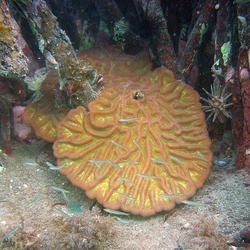Diseases of Aquatic Organisms
Diseases of Aquatic Organisms
Filter Total Items: 37
Batrachochytrium salamandrivorans (Bsal)
Batrachochytrium salamandrivorans ( Bsal ) is an emerging pathogen capable of causing significant morbidity and mortality in salamanders.
Batrachochytrium salamandrivorans (Bsal) Surveillance
Scientists of the USGS National Wildlife Health Center (NWHC) in collaboration with partners have developed risk assessments for Batrachochytrium salamandrivorans ( Bsal ) in the United States and are sampling high-risk locations for the fungus.
Research in Response to Florida’s Emerging Stony Coral (scleractinia) Diseases
Stony coral tissue loss disease (SCTLD) is a rapidly progressive disease threat to corals that results in a bleached appearance due to loss of living tissue.
Fish & Wildlife Disease: Coral Diseases and Reef Health
Corals reefs support marine biodiversity, protect coastlines from storm surges and strong waves, and provide income from tourism to coastal communities. Coral diseases were first recognized in the 1970s and are now considered a major threat to coral reef survival worldwide. Stony coral tissue loss disease (SCTLD) emerged in Florida in 2014, impacting coral reefs in Florida, Puerto Rico, US Virgin...
Manatee Health Assessment and Biomedical Studies
A multi-agency effort assesses the health of manatees and provides baseline information on their health, reproductive status, and nutritional condition.
Investigating Blotchy Bass Syndrome in Black Basses (Micropterus spp)
USGS is studying the spread and effects of “blotchy bass syndrome” on black basses ( Micropterus spp). USGS and state agencies have partnered with citizen scientists and recreational organizations to create a continent-wide biosurveillance network to monitor the syndrome.
AquaDePTH-Aquatic Disease and Pathogen Repository
The Aquatic Disease and Pathogen Repository (AquaDePTH) will be a public-facing national repository to support biosurveillance of aquatic animal diseases and pathogens. By collating historically published data, plus new aquatic pathogen and disease information, stakeholders will be able monitor fish kill and aquatic pathogen trends spatially and temporally in freshwater and marine environments...
Diseases of Fish and Wildlife
The coronavirus pandemic, Chronic Wasting Disease (CWD) in white-tailed deer, and white-nose syndrome in bats have spawned great interest in diseases of native fish and wildlife. Many aspects of widely known diseases of wild (as opposed to domestic) animal populations are poorly understood, including their ecology, incidence, distribution, and methods for reducing effects of disease on culturally...
WHISPers
WHISPers, the Wildlife Health Information Sharing Partnership - event reporting system, is a web-based repository of basic information on current and historic wildlife mortality (death) and/or morbidity (illness) events reported by partners nationwide. It is also the portal to request diagnostic and epidemiologic services from the USGS National Wildlife Health Center.
Epidemiological Services
Professionals at the NWHC include wildlife biologists, veterinarians, statisticians, epidemiologists, and informatics specialists. This multidisciplinary group conducts investigations and disease ecology studies of emerging and recurring priority wildlife diseases, maintains and analyzes comprehensive information on wildlife disease events, and provides response and management consultation and...
Fish & Wildlife Disease: Wild Fish Diseases
USGS fish disease research is focused on developing advanced tools for rapid disease detection and control. USGS scientists are improving our understanding of the factors controlling the epidemiology of aquatic animal diseases and the impact of disease on wild fish populations. Our scientists are also investigating the effects of warming waters, drought, and invasive species on fish disease...
Pathology Case of the Month
Notable cases at the National Wildlife Health Center are highlighted here in the Pathology Case of the Month Series.













